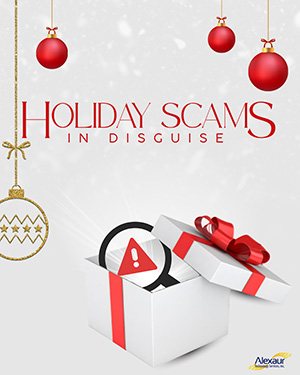 The holiday season brings out the best in people but unfortunately, it also brings out scammers who prey on goodwill. As charitable giving spikes across Greater Houston during November and December, cybercriminals ramp up their efforts to target both residents and local businesses.
The holiday season brings out the best in people but unfortunately, it also brings out scammers who prey on goodwill. As charitable giving spikes across Greater Houston during November and December, cybercriminals ramp up their efforts to target both residents and local businesses.
A few years ago, a massive telefunding fraud was shut down after authorities discovered that the perpetrators had made 1.3 billion deceptive donation calls and collected over $110 million from unsuspecting donors. (Federal Trade Commission)
Academic researchers from Cornell University found that on social media alone, more than 800 accounts operated donation scams, pushing victims toward fake fundraisers over platforms like Facebook, X and Instagram.
For Houston small businesses, even one mistaken donation can do more than cost money, it can associate your company with fraud, undermine community trust, and even expose you to broader cybersecurity risks. With charity scams becoming more sophisticated every year, knowing how to evaluate online fundraisers is essential.
How to Vet an Online Fundraiser Before You Give
Before contributing to a holiday cause whether as a business or personally make sure the fundraiser can clearly answer the basics:
- Who is organizing the fundraiser, and what is their connection to the recipient?
- How will the donations be used, and on what timeline?
- Who controls the withdrawals, and how will funds reach the intended person or organization?
- Do people close to the recipient publicly support or acknowledge the campaign?
If any details are vague, incomplete, or inconsistent, pause and ask questions before contributing… Evasive or unclear answers are a major red flag.
Red Flags That Often Signal a Scam
Scammers rely on urgency, emotion, and storytelling. Watch for warning signs such as:
- Fundraiser pages with exaggerated, misleading, or false details
- Funds not being distributed or used as described
- Impersonation of real people or stolen photos and stories
- Emotional narratives that feel overly polished or manipulative
If more than one red flag appears, treat it as a likely scam and report it to the hosting platform.
What to Check Before Donating to a Charity
Not all scams involve personal fundraisers, some mimic legitimate charities or twist real organizations’ names. Before donating, look for:
- Transparent descriptions of programs, spending, and recent financial reports
- Clear breakdowns of how much of your donation goes to services vs. overhead
- Search results that include the charity’s name along with “fraud,” “complaints,” or “scam”
If you’re a Houston-based business that donates publicly, verifying the charity’s legitimacy is especially important. Even unintentional ties to a questionable organization can impact your reputation.
Common Tactics Charity Scammers Use
Fraudsters often rely on similar patterns. Be skeptical of any request that:
- Demands donations via gift card, wire transfer, or cryptocurrency
- Comes from a website without https security
- Creates pressure to “donate right now”
- Claims you previously pledged money or supported a cause you don’t remember
Remember, even polished websites and professional-sounding messages can still be part of a scam.
Why Houston Businesses Should Be Extra Vigilant
In Houston’s tight-knit business community, especially among SMBs in areas like West Houston, Katy, and Cypress, charitable giving plays a big role in building trust. A donation made in your company’s name, by you or an employee, reflects directly on your brand. Falling for a scam can damage customer confidence and partner relationships.
Even more importantly, many of the same strategies used in charity scams appear in business-focused attacks, such as phishing emails, fake invoices, account impersonation, and fraudulent payment requests. Teaching your team how to spot fake fundraisers strengthens their awareness across all forms of cyber threats.
How to Protect Your Business (and Your Goodwill)
To keep your giving safe and intentional this holiday season:
- Create a donation policy. Outline how your company gives, who approves donations, and what verification is required.
- Educate employees. Make sure staff know how to identify suspicious campaigns, especially if they donate on behalf of the company.
- Use trusted channels. Always donate directly through the charity’s official website, not through random links, DMs, or ads.
- Stay transparent. If your business promotes its charitable efforts, double-check that you’re supporting legitimate organizations.
- Follow up after donating. Many reputable organizations publish updates and impact reports. Make sure your contribution is being used as promised.
Keep Your Holidays Generous, Not Risky
Houston thrives on community, and charitable giving is part of what makes local businesses strong. With a few smart checks, you can give confidently and avoid the traps scammers set during the holidays.
If you want your team to be trained to recognize these scams whether it's a fake charity, a phishing email, or a fraudulent payment request, we can help.
Book your free discovery call here.
The best gift you can give your business this season is protection built on awareness, smart processes, and trust your clients can rely on.



